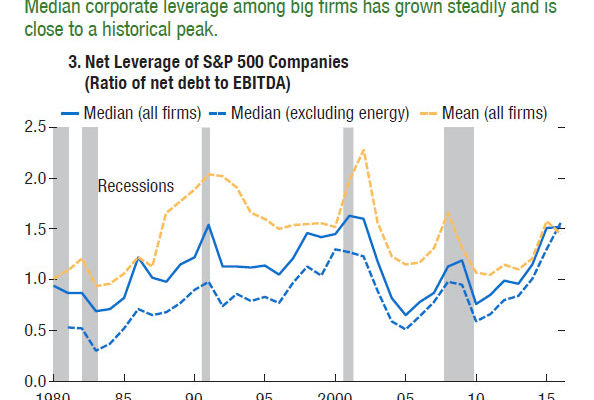While the market has been generally euphoric over Trump’s proposed fiscal agenda (even if in recent weeks it increasingly looks its implementation will be indefinitely delayed), one adverse side effect which has largely been ignored by the market is the impact of rising interest rates not only on sovereign debt, but on record corporate debt loads. Conveniently, this was one of the more notable topics covered in the latest Global Financial Stability report released by the IMF on Wednesday.
According to the IMF writes, as corporate leverage has risen, and is now at the highest level since the start either the financial crisis or the dot-com bubble, depending on which metric one uses…

… so too has the proportion of income devoted to debt servicing, notwithstanding low benchmark borrowing costs. And while the absolute level of debt servicing as a proportion of income is low relative to what it was during the global financial crisis, the 4 percentage point rise has brought it to its highest level since 2010, which leaves firms vulnerable to tighter borrowing conditions. The average interest coverage ratio—a measure of the ability for current earnings to cover interest expenses— has fallen sharply over the past two years.
Meanwhile, the IMF warns that earnings have dropped to less than six times interest expense close to the weakest multiple since the onset of the global financial crisis.

Historically, deterioration of the interest coverage ratio corresponds with an eventual widening in credit spreads for risky corporate debt. Here, the IMF is surprised to note that the market pricing of corporate risk has decoupled from the decline in interest coverage ratios, suggesting more mispricing of risk due to central bank intervention:

Declines in the interest coverage ratio have been concentrated mostly in smaller firms, which may have less access to capital market financing than their larger counterparts. Under what the IMF dubs an adverse scenario, an “unproductive fiscal expansion” could lead to a sharp rise in borrowing costs. Such a sharp rise in interest rates amid tepid earnings growth could further compromise the ability of firms to service their debt.

